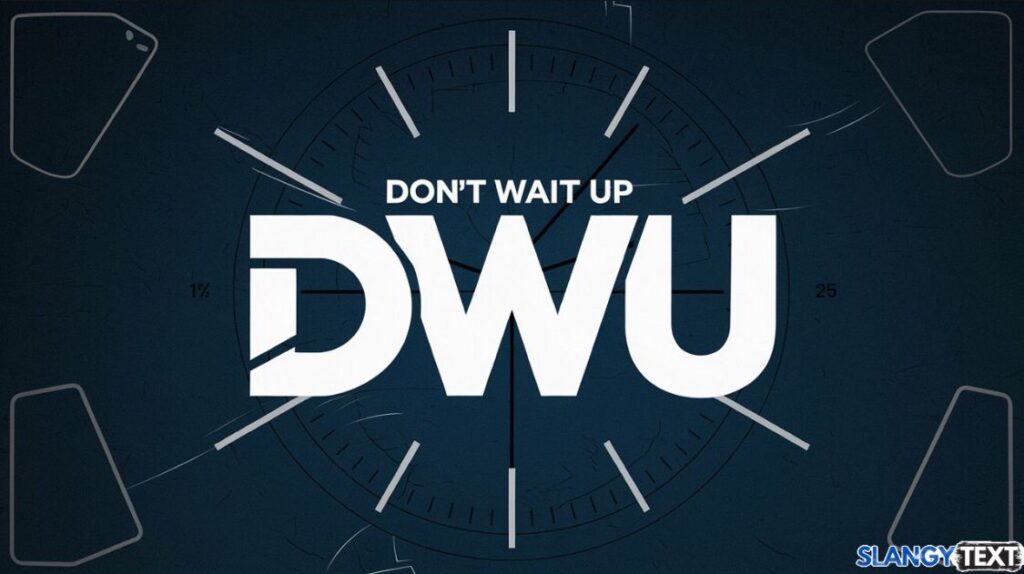In today’s fast-paced world, acronyms have become an integral part of our daily communication. One such acronym that has gained popularity in recent years is DWU.
This simple yet powerful abbreviation stands for “Don’t Wait Up,” and its usage has become widespread in various social interaction scenarios.
The Origins and Evolution of DWU
The phrase “Don’t Wait Up” has been around for decades, but its abbreviated form, DWU, has gained traction with the rise of digital communication. As people sought quicker ways to convey messages, this acronym emerged as a convenient shorthand.
From Full Phrase to Acronym
The transition from “Don’t Wait Up” to DWU reflects our society’s increasing need for brevity in messaging. This evolution is a testament to how language adapts to new technologies and communication platforms.
Decoding the Meaning Behind DWU
At its core, DWU is an informative acronym used to convey a specific intention. When someone uses DWU, they’re essentially telling the recipient not to stay awake or wait for them, as they’ll be late or won’t be returning at the expected time.
The Emotional Subtext
Beyond its literal meaning, DWU often carries an emotional subtext. It can imply consideration for the recipient’s time and sleep schedule, or it might suggest excitement about ongoing or upcoming plans.
DWU in Various Contexts
The versatility of DWU makes it applicable in numerous situations. Let’s explore some common scenarios where this acronym finds its place.
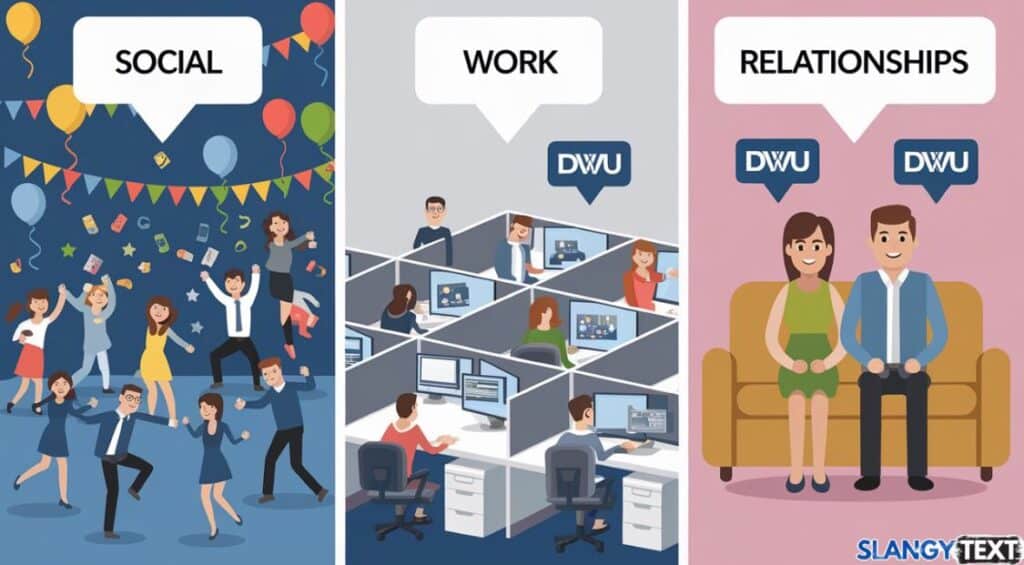
Social Gatherings and Parties
When attending a party or social event, one might use DWU to inform their partner or roommates about their plans. For instance, “Heading to Jake’s birthday bash. DWU!” This usage allows the sender to enjoy their evening without causing undue worry.
Work-Related Scenarios
In professional settings, DWU can be used to manage expectations around time management. An employee working late might message their spouse: “Big project deadline tonight. DWU, honey.”
DWU Usage in Work Scenarios
| Sender | Recipient | Message |
|---|---|---|
| Emily | Mark | Quarterly report due. DWU. |
| Jason | Sarah | Client meeting running late. DWU. |
| Olivia | David | Covering night shift. DWU, babe. |
| Michael | Lisa | Overseas conference call. DWU. |
| Sophia | Daniel | Emergency at work. DWU. |
| Ryan | Jessica | System upgrade tonight. DWU. |
| Ava | Ethan | Deadline pushed. Working late. DWU. |
| William | Emma | Inventory count. Will be late. DWU. |
| Isabella | James | Auditors in office. DWU, honey. |
| Noah | Mia | New project kickoff. DWU. |
Also like to read this : What Does DTN Mean?
The Etiquette of Using DWU
While DWU is a convenient acronym, its usage comes with certain etiquette considerations. Understanding when and how to use it appropriately can enhance your communication skills and show courtesy to others.
Timing is Everything
Sending a DWU message well in advance is generally more considerate than using it at the last minute. It allows the recipient to adjust their plans or expectations accordingly.
Context Matters
The appropriateness of using DWU can vary depending on the relationship and situation. It’s generally more safe for work and casual settings, but may not be suitable for formal communications.
DWU in Different Relationships
The use and interpretation of DWU can vary based on the relationship between the sender and recipient. Let’s explore how it functions in different dynamics.
Romantic Relationships
In romantic relationships, DWU often implies trust and independence. It allows partners to maintain their individual social lives while keeping each other informed.
DWU in Romantic Relationships
| Partner 1 | Partner 2 | DWU Message |
|---|---|---|
| Alex | Taylor | Girls’ night out. DWU, love. |
| Chris | Jordan | Watching the game at Joe’s. DWU. |
| Sam | Casey | Work dinner with clients. DWU. |
| Morgan | Jamie | Helping mom move. Might be late. DWU. |
| Riley | Quinn | Surprise party for Liam. DWU! |
| Avery | Charlie | Stuck in traffic. DWU, babe. |
| Drew | Skyler | Last-minute project. DWU, sorry. |
| Parker | Bailey | Catching up with old friends. DWU. |
| Cameron | Reese | Late yoga class tonight. DWU. |
| Peyton | Hayden | Unexpected work emergency. DWU. |
Friendships and Roommates
Among friends and roommates, DWU is often used casually to keep others informed about plans and whereabouts.
DWU in Popular Culture
The acronym DWU has found its way into various aspects of popular culture, reflecting its widespread adoption in everyday language.
Movies and TV Shows
Characters in films and television series often use DWU to convey their plans or current situations, adding a touch of realism to the dialogue.
Social Media and Texting
On platforms like Twitter and Instagram, DWU is frequently used in status updates or captions, giving followers a glimpse into the poster’s plans for the evening.
Also like to know this : What Does ICL Mean ?
The Psychology Behind DWU
The use of DWU in communication can reveal interesting aspects of human psychology and social dynamics.
Independence and Trust
When someone uses DWU, they’re often asserting their independence while still maintaining a connection with the recipient. It demonstrates a balance between autonomy and consideration.
Expectations Management
By using DWU, individuals can manage others’ expectations and reduce potential worry or confusion about their whereabouts or plans.
DWU Across Generations
The usage and understanding of DWU can vary across different age groups, reflecting generational differences in communication styles.
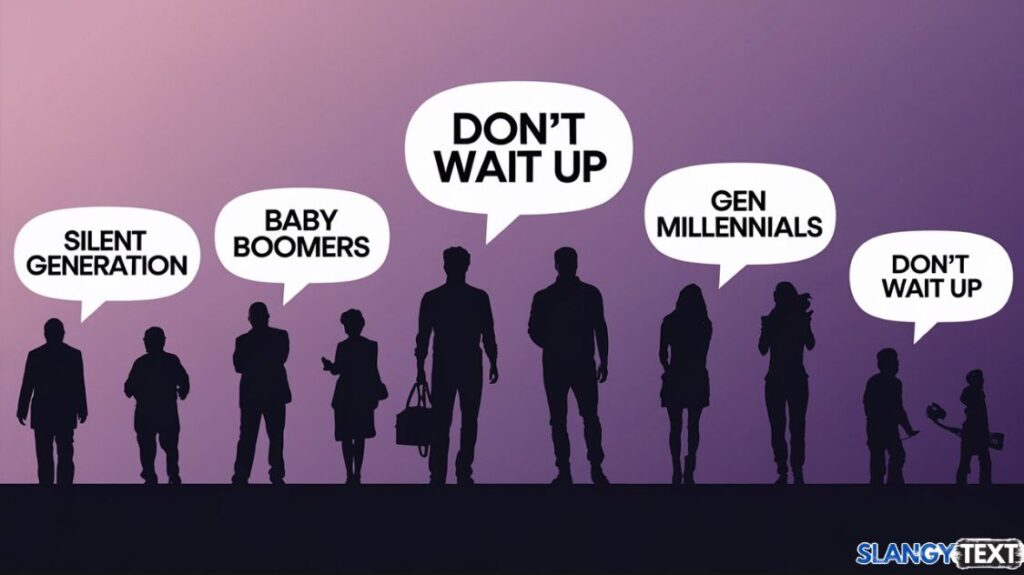
Millennials and Gen Z
Younger generations tend to use DWU more frequently and casually in their daily communications, often incorporating it into text messages and social media posts.
Older Generations
While older adults may be less likely to use DWU themselves, many have become familiar with its meaning through interactions with younger family members or colleagues.
Generational DWU Usage
| Generation | Typical DWU Usage |
|---|---|
| Gen Z | “Netflix spree. DWU fam!” |
| Millennials | “Late night at the office. DWU.” |
| Gen X | “Meeting ran over. Don’t wait up.” |
| Baby Boomers | “I’ll be home late. No need to wait.” |
| Silent Generation | “Don’t stay up for me, dear.” |
DWU in Professional Settings
While DWU is more commonly used in personal communications, it occasionally finds its way into professional contexts.
Workplace Dynamics
In some casual work environments, colleagues might use DWU when working late or attending after-hours events. However, it’s important to gauge the appropriateness based on company culture.
Client Relations
When dealing with clients, especially in different time zones, professionals might use a more formal version of DWU to manage expectations about response times or availability.
Also like to know this : What Does Casi-Algo Mean?
The Global Reach of DWU
As English continues to be a dominant language in international communication, acronyms like DWU have spread beyond English-speaking countries.
Cross-Cultural Understanding
Non-native English speakers often learn acronyms like DWU as part of their language studies, helping them navigate casual conversations with native speakers.
Regional Variations
While DWU is widely understood, some regions may have their own local equivalents or variations that serve a similar purpose in communication.
DWU and Time Management
The use of DWU often intersects with aspects of time management and scheduling in our daily lives.
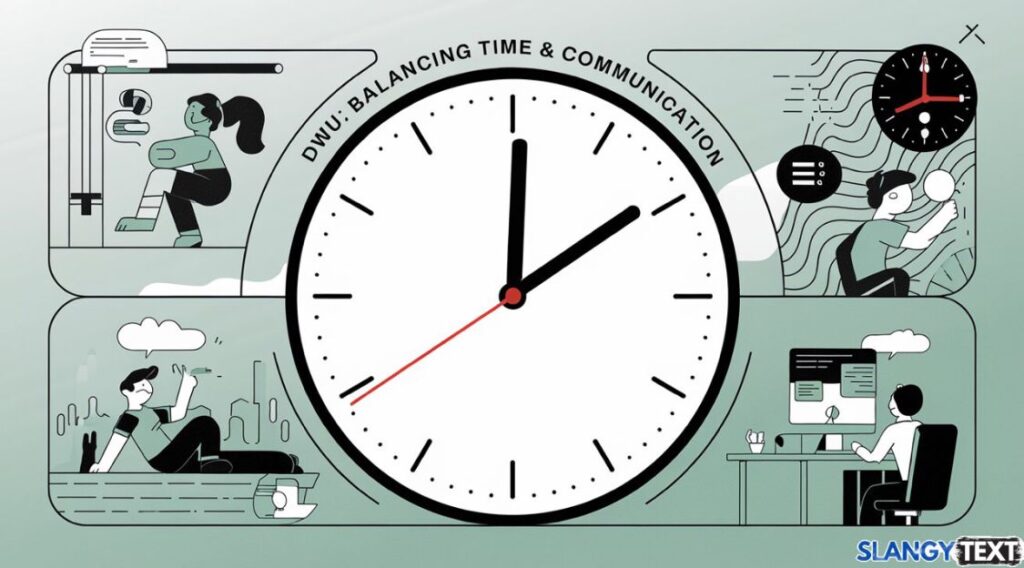
Setting Boundaries
By using DWU, individuals can set clear boundaries between their personal and professional lives, indicating when they need uninterrupted time for work or leisure.
Reducing Time Anxiety
For those waiting at home, receiving a DWU message can alleviate anxiety about when someone might return, allowing them to relax or make alternative plans.
DWU and Time Management Scenarios
| Scenario | DWU Message | Time Management Implication |
|---|---|---|
| Late work meeting | “Budget review. DWU.” | Allows partner to plan evening independently |
| Friend’s birthday | “At Sarah’s party. DWU!” | Gives roommates freedom to lock up and sleep |
| Gym session | “Hit the gym after work. DWU.” | Partner can have dinner without waiting |
| Traffic jam | “Stuck on highway. DWU.” | Family can start bedtime routine without stress |
| Night class | “Evening lecture. DWU, honey.” | Spouse can make solo plans for the night |
| Doctor’s appointment | “Annual check-up running late. DWU.” | Babysitter knows to stay longer if needed |
| Book club meeting | “Discussion went overtime. DWU.” | Housemates know not to worry about late return |
| Volunteering event | “Shelter needs extra hands. DWU.” | Family aware of extended absence |
| Concert | “Show just started. DWU!” | Indicates late night out to those at home |
| Last-minute project | “Deadline pushed. Working late. DWU.” | Manages expectations for arrival time |
DWU in Digital Communication
The rise of digital platforms has significantly influenced how and when we use acronyms like DWU.
Instant Messaging
On platforms like WhatsApp or Facebook Messenger, DWU is often used in real-time to update others about ongoing situations or last-minute changes in plans.
Email Etiquette
While less common in emails, DWU might appear in more casual work correspondence, especially when discussing after-hours work or events.
Also like to read this : What Does Tysn Mean?
The Future of DWU
As language and communication continue to evolve, the usage and meaning of DWU may shift over time.
Emerging Technologies
With the advent of new communication technologies, such as augmented reality messaging, the way we use and interpret acronyms like DWU may adapt to these new platforms.
Linguistic Evolution
As with all language elements, DWU may evolve in meaning or be replaced by new acronyms that better reflect changing social norms and communication habits.
DWU and Relationship Dynamics
The use of DWU can offer insights into the nature of various relationships and how individuals navigate their social connections.
Trust and Independence
When partners or friends comfortably use DWU with each other, it often indicates a relationship built on trust and respect for individual autonomy.
Communication Styles
The frequency and context of DWU usage can reveal much about a person’s communication style and how they balance their social obligations.
DWU in Different Relationships
| Relationship | DWU Example | Implication |
|---|---|---|
| Newlyweds | “Girls’ night out. DWU, honey!” | Maintaining individuality in marriage |
| Long-term partners | “Working late again. DWU.” | Established routine and understanding |
| Parent to teen | “Movie running late. DWU.” | Teaching responsibility and communication |
| Roommates | “Date night! DWU guys.” | Courteous informing of plans |
| Siblings | “Covering night shift. DWU.” | Keeping family informed |
| Close friends | “After-party at Jake’s. DWU!” | Shared social circle and trust |
| Colleagues | “Client dinner. Might be late. DWU.” | Professional courtesy |
| New relationship | “Drinks with coworkers. DWU?” | Testing boundaries and expectations |
| Long-distance couple | “Late night call with family. DWU, love.” | Maintaining connection despite distance |
| Elder parent to adult child | “Bridge club tonight. Don’t wait up, dear.” | Asserting independence while keeping informed |
DWU and Social Norms
The widespread use of DWU reflects changing social norms around availability and personal time.
Always Connected
In an era where we’re often expected to be constantly reachable, DWU serves as a polite way to create temporary disconnection and personal space.
Balancing Act
Using DWU helps individuals navigate the delicate balance between maintaining social connections and preserving personal boundaries.
DWU in Various Social Scenarios
Let’s explore how DWU is used across different social situations and what it reveals about modern social dynamics.
Nights Out
When friends gather for a night on the town, DWU often makes an appearance in group chats, signaling an intention to make the most of the evening.
Family Dynamics
Within families, DWU can be used to maintain independence while still showing consideration for others’ concerns or schedules.
DWU in Social Scenarios
| Scenario | DWU Message | Social Implication |
|---|---|---|
| Bachelor party | “Vegas, baby! DWU for the weekend!” | Celebration of freedom and friendship |
| Book club | “Discussion ran over. DWU, hon.” | Intellectual engagement over timekeeping |
| Sports event | “Game went into overtime. DWU.” | Shared excitement over an unpredictable event |
| Girls’ night | “Spa day turned into spa night. DWU!” | Prioritizing self-care and female bonding |
| Gaming session | “Raid night. DWU, folks.” | Commitment to hobby and online community |
| Networking event | “Great connections made. DWU.” | Prioritizing career growth opportunities |
| Family reunion | “Catching up with cousins. DWU.” | Valuing extended family connections |
| Volunteer work | “Shelter needs extra hands. DWU.” | Commitment to community service |
| Art gallery opening | “After-party at the studio. DWU.” | Engaging with local culture and creativity |
| Political rally | “Important speech tonight. DWU.” | Civic engagement and political activism |
The Art of Using DWU Effectively
While DWU is a useful tool in our communication arsenal, its effectiveness depends on how and when it’s used.
Timing and Frequency
Using DWU too frequently might diminish its impact or could be seen as dismissive. It’s most effective when used thoughtfully and sparingly.
Complementary Information
Pairing DWU with additional context can make the message more informative and considerate. For example, “Working late on the Johnson account. DWU, but I’ll text when I’m on my way home.”
DWU and Emotional Intelligence
The appropriate use of DWU can be a sign of high emotional intelligence, demonstrating an awareness of others’ feelings and needs.
Consideration for Others
By using DWU, you show that you’re thinking about the other person’s time and potential worry, even as you pursue your own plans.
Clear Communication
DWU helps in setting clear expectations, which is a key aspect of emotionally intelligent communication.
DWU in the Age of Remote Work
With the rise of remote and flexible work arrangements, DWU has found new applications in professional settings.
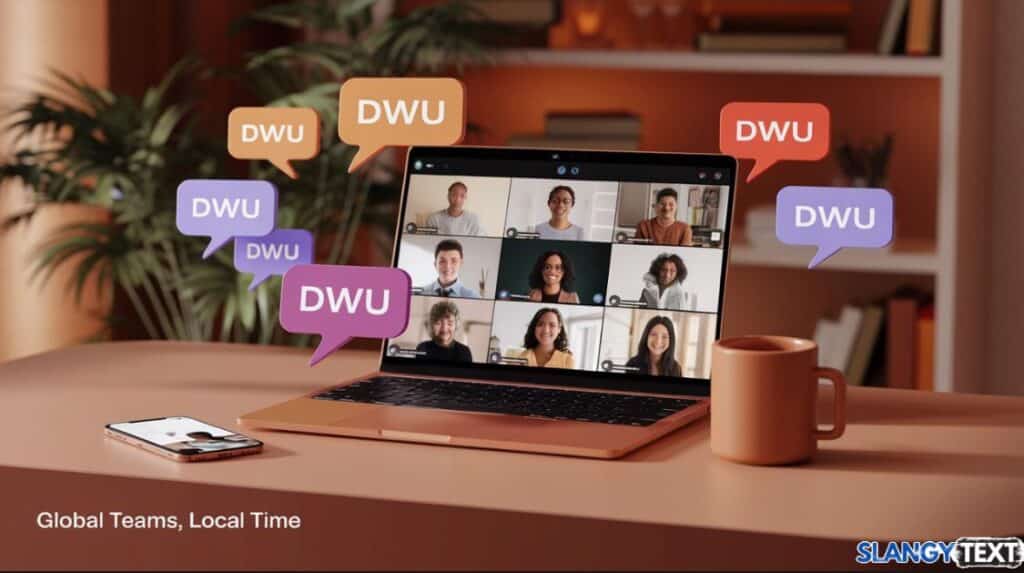
Global Teams
For teams spread across time zones, DWU can be a useful way to signal the end of one’s workday without implying that others should stop working.
Work-Life Balance
In a world where work and personal life often blend, DWU helps create necessary boundaries and downtime.
DWU in Remote Work Scenarios
| Scenario | DWU Message | Work Implication |
|---|---|---|
| Late night coding | “Debugging the new feature. DWU team.” | Dedication to project completion |
| International call | “Early call with Tokyo office. DWU.” | Global business operations |
| Flexible hours | “Starting late tomorrow. DWU tonight.” | Adapting to personal productivity rhythms |
| Project deadline | “Finalizing report. DWU everyone.” | Commitment to meeting deadlines |
| Virtual team building | “Online game night with the team. DWU!” | Fostering remote team cohesion |
| Time zone differences | “It’s EOD here. DWU colleagues.” | Respecting global work schedules |
| Home office setup | “Setting up new equipment. Might work late. DWU.” | Investing in productive work environment |
| Digital detox | “Offline for the evening. DWU.” | Prioritizing mental health in digital age |
| Continuous learning | “Taking a night class. DWU team.” | Commitment to professional development |
Conclusion
In conclusion, the acronym DWU (Don’t Wait Up) has become a versatile and widely used expression in modern communication. From its origins as a simple phrase to its current status as a ubiquitous acronym, DWU has adapted to various contexts, relationships, and generational preferences. It serves as a tool for managing expectations, setting boundaries, and expressing consideration in both personal and professional settings.
As our communication methods continue to evolve in the digital age, DWU remains a succinct yet powerful way to convey intentions and maintain social connections while respecting individual autonomy. Whether used in romantic relationships, friendships, or workplace interactions, DWU reflects the changing dynamics of our fast-paced, interconnected world.
You might also like to read this : What Does WRD Mean In Texting?

Kayla Rogers is a writer at Slangy Text who loves exploring modern acronyms & slangs and how they shapes our conversations. She enjoys sharing fun and interesting articles that connect with readers. When she’s not writing, Kayla likes to keep up with the latest trends or relax with a good book.

